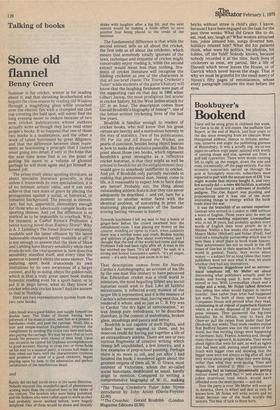Bookbuyer's
Bookend
There will be smug grins in clubland this week, for Gee is to die. It will expire, the ineffable Gee Report, at the end of March, just' four years to the day since emerging from an obscure West Hampstead address, thence to irritate, embarrass, unnerve and anger the publishing gnomes of Bloomsbury. It was a scruffy rag, six-to-ten pages on carbon-copy paper, splayed with words of varying shape and size, spewed out from a golf-ball typewriter. There were words running left to right, up the margin, down the side and even, occasionally, off the page entirely. For this eccentric concoction, served up through the post at fortnightly intervals, subscribers were expected to part with the annual sum of £35. You might wonder that anyone bought it, and very few actually did — a mere 400 faithfuls, scattered across four continents at addresses of doubtful pedigree. The ,Gee Report was puzzling and preposterous and it was one of the most interesting things to emerge within the book trade since the war.
It was the brainchild of an earnest expatriate German who arrived in London in 1968 without a word of English. Three years later he met up with a wise-cracking expatriate Liverpudlian who, in his 38 years, had probably spoken more words of English than most people do in a lifetime. Within a few weeks this unlikely duo, Messrs Meller (Michael) and Nolan (Fred), had evolved a remarkable partnership which was to earn them a small place in book trade history. Their achievement lies not so much in the 101 issues of Gee but in their approach to the book world in general. Firstly, they wrote about money — a subject for so long taboo that many publishers were not sure what it was, let alone whether they had any themselves.
With Germanic doggedness and an astronomical telephone bill, Mr Meller set about discovering what publishers actually paid for books, and having paid it, how much they earned or lost. With Liverpudlian cheek and a nudge and a wink, Mr Nolan talked directors into telling him what would happen in twelve months' time rather than what had happened last week. The both of them spent hours at Companies House and printed what they read, culminating in an exposé of paperback finances which, at a stroke, disposed of 20 years' flossy press releases. They pioneered the big-time bestseller list in Britain, only to have the Observer pull the carpet from under their feet (Bookend, last week). They made readers realise that Bedford Square was not the centre of the world, but that exciting things were happening in Germany, Italy, France, America and, though many chose to ignore it, in Australia. They wrote about rights that were for sale, as well as rights that had been sold, putting small publishers in touch with bigger ones and showing that the bigger ones were not always so big after all. And they wrote about people: what they were doing, rather than what they were saying. Time and again, Gee printed it first — sometimes disguising fact as rumour, occasionally getting rumour mixed up with fact — and always in a jokey scurrilous tone which would have offended even the semi-literate — and did.
Now the party is over. Mr Meller will soon go to America, there to wheel and deal as only he knows how. Mr Nolan will write novels and no doubt become one of the book world's big earners. The best of luck to them both.


































 Previous page
Previous page